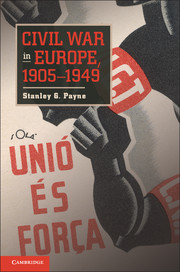Book contents
- Frontmatter
- Contents
- Preface
- Chronology of Events
- Glossary of Political Acronyms
- Introduction Revolution and Civil War as Forms of Conflict
- Part One World War I and An Era of Internal Conflict, 1905???1935
- 1 World War, Revolution, Civil War, 1905???1918
- 2 The Russian Civil War, 1917???1922
- 3 The Political and Social Crisis in Europe, 1918???1923
- 4 Civil Strife and Dictatorship, 1930???1935
- Part Two The Conflict In Spain, 1931???1939
- Part Three Civil War and Internal Violence in The Era of World War II
- Index
- References
3 - The Political and Social Crisis in Europe, 1918???1923
Published online by Cambridge University Press: 05 June 2012
- Frontmatter
- Contents
- Preface
- Chronology of Events
- Glossary of Political Acronyms
- Introduction Revolution and Civil War as Forms of Conflict
- Part One World War I and An Era of Internal Conflict, 1905???1935
- 1 World War, Revolution, Civil War, 1905???1918
- 2 The Russian Civil War, 1917???1922
- 3 The Political and Social Crisis in Europe, 1918???1923
- 4 Civil Strife and Dictatorship, 1930???1935
- Part Two The Conflict In Spain, 1931???1939
- Part Three Civil War and Internal Violence in The Era of World War II
- Index
- References
Summary
Revolutionaries were correct that the effects of the world war would be profoundly destabilizing, but in Europe as a whole the outcome was quite different from what they expected. Though the war destroyed the empires of central and eastern Europe, one of its major consequences was to exacerbate nationalism even more. The Balkanization of east central Europe made long-term international equilibrium more difficult to attain, for the new buffers between Germany and the Soviet Union were weak. Commerce had been severely disrupted and state control of production greatly expanded, with the result that a full international market could not be restored for decades, until well into the second half of the century. The war destroyed part of the fabric of European culture, seriously diminishing belief in common values and the nineteenth-century faith in progress, producing a brutalization of politics in central and eastern Europe, and to some extent in Spain as well. It introduced great social turmoil in eastern and central Europe, and to a lesser degree in the western European countries, though in central and eastern Europe the chief beneficiaries would be the new nationalist and fascist movements that crystallized out of the postwar crisis.
- Type
- Chapter
- Information
- Civil War in Europe, 1905–1949 , pp. 69 - 95Publisher: Cambridge University PressPrint publication year: 2011



